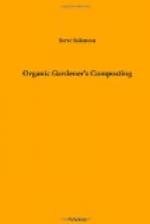A Brief History of the Organic Movement
How did all of this irresolvable controversy begin over something that should be scientifically obvious? About 1900, “experts” increasingly encouraged farmers to use chemical fertilizers and to neglect manuring and composting as unprofitable and unnecessary. At the time this advice seemed practical because chemicals did greatly increase yields and profits while chemistry plus motorized farm machinery minus livestock greatly eased the farmer’s workload, allowed the farmer to abandon the production of low-value fodder crops, and concentrate on higher value cash crops.
Perplexing new farming problems—diseases, insects and loss of seed vigor—began appearing after World War 1. These difficulties did not seem obviously connected to industrial agriculture, to abandonment of livestock, manuring, composting, and to dependence on chemistry. The troubled farmers saw themselves as innocent victims of happenstance, needing to hire the chemical plant doctor much as sick people are encouraged by medical doctors to view themselves as victims, who are totally irresponsible for creating their condition and incapable of curing it without costly and dangerous medical intervention.
Farming had been done holistically since before Roman times. Farms inevitably included livestock, and animal manure or compost made with manure or green manures were the main sustainers of soil fertility. In 1900 productive farm soils still contained large reserves of humus from millennia of manuring. As long as humus is present in quantity, small, affordable amounts of chemicals actually do stimulate growth, increase yields, and up profits. And plant health doesn’t suffer nor do diseases and insects become plagues. However, humus is not a permanent material and is gradually decomposed. Elimination of manuring steadily reduced humus levels and consequently decreased the life in the soil. And (as will be explained a little later) nitrogen-rich fertilizers accelerate humus loss.
With the decline of organic matter, new problems with plant and animal health gradually developed while insect predation worsened and profits dropped because soils declining in humus need ever larger amounts of fertilizer to maintain yields. These changes developed gradually and erratically, and there was a long lag between the first dependence on chemicals, the resulting soil addiction, and steady increases in farm problems. A new alliance of scientific experts, universities, and agribusiness interests had self-interested reasons to identify other causes than loss of soil humus for the new problems. The increasingly troubled farmer’s attention was thus fixated on fighting against plant and animal diseases and insects with newer and better chemicals.




